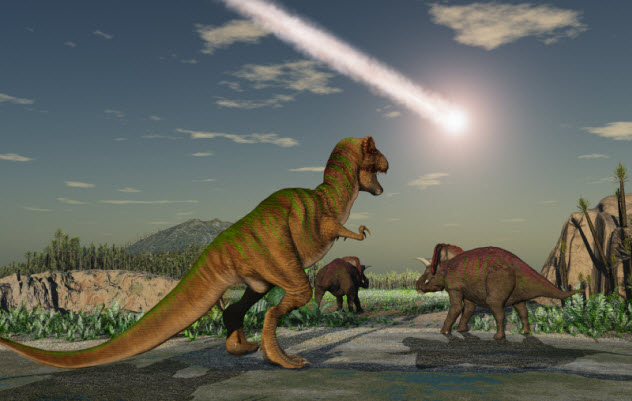 Weird Stuff
Weird Stuff  Weird Stuff
Weird Stuff  Health
Health Ten Confounding New Inventions from the World of Biomedicine
 Creepy
Creepy 10 Death Superstitions That Will Give You the Creeps
 Movies and TV
Movies and TV 10 Movies That Get Elite Jobs Right, According to Experts
 Weird Stuff
Weird Stuff 10 Times Real Laws Were Based on Bizarre Hypotheticals
 Animals
Animals 10 Inspiring Tales of Horses Being Human
 Mysteries
Mysteries Top 10 Haunting Facts About the Ghost Ship MV Alta
 History
History 10 Surprising Stories About the Texas Rangers
 Humans
Humans 10 Philosophers Who Were Driven Mad by Their Own Theories
 Miscellaneous
Miscellaneous 10 Video-Game-Worthy Weapons and Armors from History
 Weird Stuff
Weird Stuff 10 Warning Labels That Exist Because Someone Actually Tried It
 Health
Health Ten Confounding New Inventions from the World of Biomedicine
 Creepy
Creepy 10 Death Superstitions That Will Give You the Creeps
Who's Behind Listverse?

Jamie Frater
Head Editor
Jamie founded Listverse due to an insatiable desire to share fascinating, obscure, and bizarre facts. He has been a guest speaker on numerous national radio and television stations and is a five time published author.
More About Us Movies and TV
Movies and TV 10 Movies That Get Elite Jobs Right, According to Experts
 Weird Stuff
Weird Stuff 10 Times Real Laws Were Based on Bizarre Hypotheticals
 Animals
Animals 10 Inspiring Tales of Horses Being Human
 Mysteries
Mysteries Top 10 Haunting Facts About the Ghost Ship MV Alta
 History
History 10 Surprising Stories About the Texas Rangers
 Humans
Humans 10 Philosophers Who Were Driven Mad by Their Own Theories
 Miscellaneous
Miscellaneous 10 Video-Game-Worthy Weapons and Armors from History
10 Important Things You Won’t Believe We Managed To Lose Forever
It’s no secret that we humans suck at looking after stuff. But it’s one thing to lose a painting or classic movie and another to lose the most basic things holding our civilization together.
We’ve told you before about the priceless cultural artifacts and historic sites that our species has managed to misplace over the years. But those valuable losses had nothing on this lot.
10 Our Most Invaluable Audio Recordings

For the vast majority of human existence, creating an archive of sounds was physically impossible. Speeches vanished into the ether, along with performances, songs, and accents.
Then in the late 19th century, we finally figured out a way to preserve these sounds for future generations. It was a watershed moment in human evolution . . . and human stupidity. No sooner had we started recording valuable sounds than we began destroying them.
First to go was music. In the early days of phonograph companies, no one thought that the songs they were recording would one day be valuable. Pioneering examples of American gospel music, jazz, folk, and blues were all lost forever when recording companies destroyed the masters used to press wax discs and sold them as roofing shingles. Today, it’s thought that over half of all recordings made during the first 23 years of American music are missing.
Later artists were affected, too. We’ve lost entire pieces by Frank Sinatra, Judy Garland, and George Gershwin, along with hundreds of unique author readings, radio interviews, and historic speeches. We even managed to misplace a recording made by the crew of the Enola Gay the moment they dropped the atom bomb—a vital piece of history now lost forever.
9 The Last Two Decades Of Scientific Data

Science survives on raw data. Without good data to back them up, our conclusions are essentially worthless. Yet scientists are surprisingly bad at holding on to that data. According to a 2013 study published in Current Biology, the vast majority of raw data from experiments over the last two decades is now completely inaccessible.
The team looked at 516 papers published between 1991 and 2011. To their grim surprise, they found that the amount of data missing or destroyed from the most recent papers was 23 percent. When the team checked the oldest papers, they found that 90 percent of the raw data was gone forever.
The problem comes from data that is stored online. When links break, sites are deleted, or email addresses go dark, it becomes impossible for researchers to access that data. For 25 percent of studies, no email addresses could be found for those involved. For another 38 percent, requests for raw data received no response. Other important files were stored on now-defunct hardware. Smithsonian magazine claims that this data is now impossible to retrieve.
The worst part is that this data can often help science—even decades later. In the 1980s, zoologist Timothy Vines was conducting research into a pair of toad species native to Eastern Europe. Thanks to raw data from a small Polish study published in 1930, they were able to make a breakthrough. If Vines were doing that research now and relying on studies from 1991, that breakthrough would never happen.
8 Two Decades Of Supreme Court Citations

Supreme Court citations are to law what raw data is to science. They’re the little details that help to give context to a legal decision by the highest authority in the land. They set precedent for possibly decades to come. A huge amount of them are now lost forever.
Since 1996, the Supreme Court has cited materials on the Internet 555 times. According to a 2013 study, nearly 50 percent of the URLs contained in those judgments now lead nowhere. This includes citations in cases like Scott v. Harris.
In 2001, sheriff’s deputy Timothy Scott engaged 19-year-old Victor Harris in a high-speed car chase. The chase ended with Harris being paralyzed, and Harris sued Scott for excessive force. When the case finally arrived before the Supreme Court, their verdict was heavily influenced by an online video taken from Scott’s dashcam. Links to that video are now broken, so it is impossible today to contextualize the court’s decision.
According to Adam Liptak in The New York Times, this link rot means that Supreme Court decisions are “increasingly built on sand.” In some cases, cited materials now even undermine the court’s authority. One 2011 citation on violent video games now leads to a message that cheekily reads:
Aren’t you glad you didn’t cite to this Web page? If you had, like Justice Alito did, the original content would have long since disappeared and someone else might have come along and purchased the domain to make a comment about the transience of linked information in the Internet age.
7 Britain’s Television History
For such a tiny island, Britain’s contribution to global culture has been massive. Probably everyone reading this has heard of Monty Python, Doctor Who, and the Beatles. A large part of that contribution came from television, which for a long time meant the BBC. Thanks to some spectacularly bad decisions made by the corporation in the 1960s and ’70s, a huge chunk of Britain’s television history is lost forever.
Famously, this includes nearly 100 episodes from the early days of Doctor Who. But the losses go far beyond a single sci-fi show. Bob Dylan’s first acting role (including his first televised performance of “Blowin’ in the Wind”) is missing, as is work by Ridley Scott, playwright Dennis Potter, Peter Cook, and Dudley Moore.
Most of the seminal sci-fi serial The Quatermass Experiment—which revolutionized TV sci-fi—is gone, as are episodes of comedy gems like Dad’s Army and Hancock’s Half Hour. As shown in the video above, the Beatles’ only appearance on live music show Top of the Pops now has just 21 seconds of surviving footage, ironically preserved in a surviving episode of Doctor Who.
The fault lies with the BBC itself, which wiped old tapes to save money. Still, it could have been worse. At one point, the corporation seriously considered wiping all of Monty Python.
6 One-Third Of All Bitcoins

Although many people continue to predict that it’s doomed, there’s no doubt that bitcoin is now a major currency. One analysis by The Money Project placed it as the best-performing currency in the world for 2015. There are currently billions of dollars’ worth of coins wrapped up in the project. All of which only serves to make the tales of zombie coins that much crazier.
Unlike banks, bitcoins have zero regulation. If you die without passing on your key (basically, a password), your coins die with you. Same deal if you lose your hard drive or suffer a catastrophic crash. Those bitcoins can never be used again, even though they continue to exist within the system. These useless coins are known as zombie coins. According to a study by NVIDIA engineer John Ratcliff, they could now account for around 30 percent of all bitcoins in existence.
A bitcoin’s value changes so much that we won’t put a number on it here. But at the time of Ratcliff’s study, the value of the zombie coins was equivalent to nearly $1 billion. Some of these bitcoins had been deliberately rendered inaccessible by shadowy groups through a process known as “burning.” That’s $1 billion effectively lost forever—the digital equivalent of a ship carrying Spanish gold sinking to the ocean floor.
5 One-Quarter Of The World’s Language Families

The Indo-European language family is comprised of tongues as varied as English, Spanish, Greek, Russian, Kurdish, and Nepali. Losing this language family would mean losing all the poetry, legends, novels, songs, and histories of each of those languages and hundreds more.
In the course of human history, a loss like this hasn’t happened once, twice, or even 20 times. At least 100 language families have been lost, along with all their individual languages. This represents almost one-quarter of all language families that ever existed.
Given the length of time that humanity has existed, this might not seem like such a big deal. But there are signs that the rate of loss is accelerating. Of the 100 language families known to have been lost, 28 vanished in the last century.
The rate of extinction was so great that a language died out every three months. By 2100, it’s estimated that around 50 percent of the world’s 6,500 languages will be extinct. Some put the figure at an alarming 90 percent. That’s a lot of culture wiped out in a single century.
4 A Generation Of Gaming History

Like it or not, gaming is now a massive part of our culture, as important to our civilization as music or TV. So it should come as no surprise to learn that we’re already doing our best to misplace valuable chunks of it. While classics like Space Invaders are safe for future generations, more recent games are in the process of being lost forever. Especially those that exist solely on the Internet.
If you’ve ever played an unpopular MMO—like Glitch or City of Heroes—you’re probably familiar with this scenario: Business is bad, so the company eventually shuts off the servers. This is good for the company but catastrophically bad for historians.
In the blink of an eye, almost all traces of a generation-defining game can vanish. This is not so bad now, when it remains within living memory. But a historian’s job is to think about the future. In 200 years, serious historians may well be digging over our dusty old blog posts and wondering what EVE Online or World of Warcraft was.
Updates create similar problems. A game like Farmville is arguably of major historical value: For better or worse, it changed the way a generation thinks of games. It’s still around, too, only it’s not the same anymore. Since 2009, Farmville has been updated so many times that tracing its evolution is already effectively impossible. Games historians are already warning that this will become a massive problem in coming decades.
3 Nearly All Our Food

Mass production was one of the greatest things to happen to farming, at least in terms of getting people fed. It also caused catastrophic damage to species diversity. Thanks to selective breeding practices, we’ve managed to wipe out nearly everything our ancestors used to eat.
Take apples. For a foodstuff, they’re an extremely important part of American identity. That’s why people still say “as American as apple pie” and not “as American as a Big Mac with extra fries.” Yet those apple pies that your grandma’s grandma used to bake have little in common with anything you could throw together today. In the last 100 years, 86 percent of all apple varieties in the US have disappeared.
This has struck regional dishes hard. Choctaw hogs, Midget White turkeys and American chestnuts used to be regular features on regional menus. But all have now vanished forever. Globally, the outlook is similarly bleak. Compared to pre-1900, around 75 percent of farmed plant diversity has been lost.
This lack of genetic diversity leaves surviving species dangerously open to disease. Right now, an infection is on the verge of wiping out the common banana.
2 99 Percent Of Species

Over the years, the Earth has lost plenty of species. All of us can probably name a handful off the top of our heads: dinosaurs, the dodo, the passenger pigeon, the woolly mammoth, and so on. But the sheer, mind-boggling scale of these extinctions may be even greater than you imagined. It’s estimated that 99 percent of all species that ever lived are now extinct.
Soon, that astounding figure may get even higher. In 2015, a group of scientists published a paper claiming that Earth is in the middle of a sixth mass extinction event. We’ve had these in the past, and they’re never pretty. Most famous is the one that killed the dinosaurs.
However, that mass extinction only killed off the bigger animals on Earth. The Permian-Triassic extinction wiped out about 90 percent of the species alive at that time. If we have another mass extinction of that size, our 99 percent figure may soon look more like 99.9 percent.
Whether or not we’re really in another mass extinction event, the sheer number of species that we’ve lost in the past remains quietly tragic. Perhaps saddest of all are those animals that died out without leaving any trace in the fossil records.
1 Vital Skills

As technology improves, more aspects of daily life are becoming automated. For example, self-driving cars may be everywhere in the future. Also, a recent report found that nearly half of all young people fear that their jobs will be automated in 10 years.
In some ways, automation is great news. Self-driving cars will probably lead to fewer crashes and fewer deaths. In other ways, it’s something of a disaster. As more jobs become automated, we’re forgetting how to do the simplest things.
Take the recent research into the Igloolik Inuit tribe. For centuries, annual hunts relied on expert wayfinding abilities that were passed down through generations. Then GPS came on the scene, and the need to retain these abilities vanished. A few years later, people noticed a sharp uptick in the number of catastrophic hunting accidents as hunters became lost after their GPS failed.
A similar problem is happening today with airline pilots. On a typical passenger flight, a pilot holds the controls for a mere three minutes. When the autopilot fails, pilots without manual experience often make mistakes.
In 2009, a French pilot flying from Rio to Paris panicked when the autopilot disengaged. He slowed the plane and continued to slow it even when the warning alarm sounded. His reaction caused the plane to fall into the Atlantic, killing all 228 people on board. Not long after, veteran pilot Rory Kay, the former top safety official of the Air Line Pilots Association, warned that “we’re forgetting how to fly.”
If we carry on this way, it won’t be long before we’re all like the humans in WALL-E—flummoxed by the technology around us, even as we rely on it to do everything.








